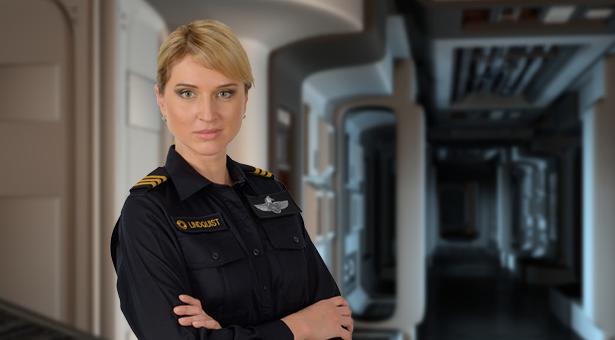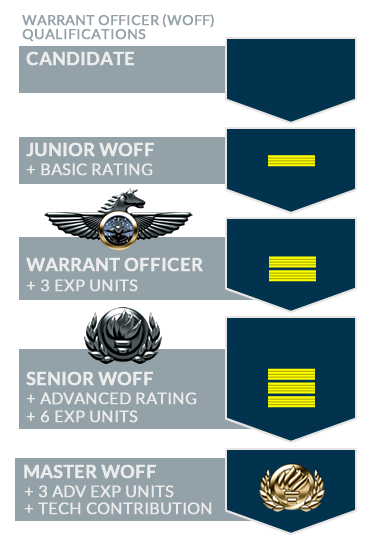

The Warrant Officer program allows technical specialists to operate and contribute within a military chain of command while having their experience and seniority recognised appropriately. This means they are able to undertake active duty aboard vessels (unlike civilian advisors).
The concept is drawn from naval tradition, where a valuable technical specialist might enter the navy directly as a ranking officer by receiving a warrant from the admiralty, rather than a commission borne from prior service experience.
Career Tracks
Warrant Officers join the ISDC from advanced careers in specialist technical or scientific fields. Unlike the military careers of their commissioned colleagues, warrant officers have undertaken exclusively civilian career development prior to their entry to the ISDC.
Despite their advanced knowledge, warrant officers will need to be familiar with ship systems specific to their specialistion and so must complete training on those systems before they can undertake missions.
A combination of training and mission experience determines advancement.
Ratings
 When training is completed on a ship system a qualification known as a rating is awarded, so called because it means the successful trainee is now ‘rated’ to operate that system during missions.
When training is completed on a ship system a qualification known as a rating is awarded, so called because it means the successful trainee is now ‘rated’ to operate that system during missions.
Ratings are awarded at basic and advanced levels.
Experience
Active duty on missions is logged as evidence of experience, expressed in units of 100 hours.
Experience is gained at basic and advanced levels, depending on the assessed complexity of a mission.
Qualification and Advancement
Initial entry is as a candidate. Warrant officers receive the same common training as any other crew or officer candidate. After this has been completed, the candidate will be asked to select an appropriate rating to train towards. When this is complete, the newly promoted Junior Warrant Officer will be able to join missions and begin gaining experience.
Accumulated experience allows an advance in rank to Warrant Officer.
Advancement to Senior Warrant Officer requires additional experience and attainment of an advance rating within the warrant officer’s specialisation.
Master Warrant Officer
Master Warrant Officer is not a rank, but a Senior Warrant Officer with a master rating.
Unlike basic and advanced ratings there is no formal training course to achieve a master rating, which is awarded on the basis of advanced mission experience and the contribution of a technical or scientific innovation within the warrant officer’s specialisation.
Changing Career Tracks
There is no policy preventing changing between career tracks. Ratings and accumulated experience can be transferred without penalty, with equivalent rank awarded subject to candidate suitability.








